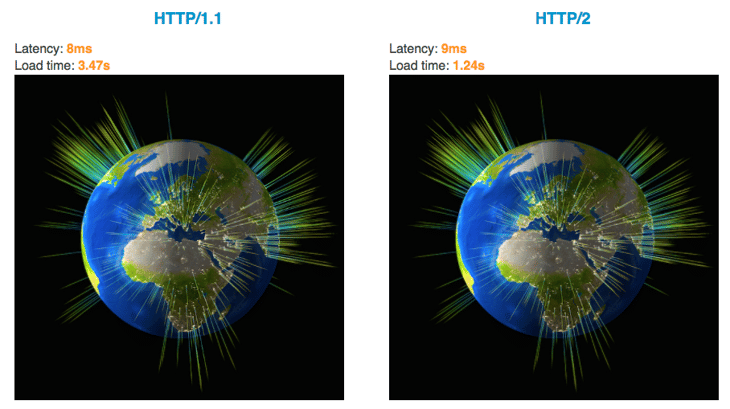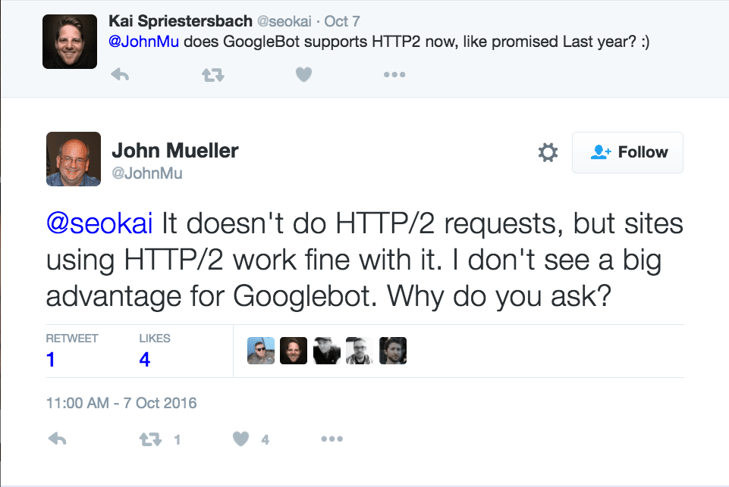Could HTTP/2 be the Next Big Ranking Factor?
Could HTTP/2 be the Next Big Ranking Factor?
Get weekly
HubSpot Updates
HTTP/2 is the newer, faster version of the HTTP protocol that offers a range of benefits over standard HTTP - but how might it affect your SEO? In this blog, we’ll take a quick look at these network protocols, as well as cover which one you should be using.
Definitions
Before we look into the benefits of HTTP2 and consider how it might affect SEO, let’s quickly define HTTP, HTTPS and HTTP2.
HTTP
HTTP stands for Hypertext Transfer Protocol, and is the method by which servers and browsers communicate to serve content to users.
The browser contacts the server after you type in the URL and requests that it delivers the webpage. The server then delivers the content back to the browser, which renders it using programs the browser is configured to use for that type of file (e.g. .html, .pdf, .flv etc.).
This process is repeated for each element on the page until it is fully loaded.
HTTPS
HTTPS is a more secure method of transferring data. It is the same as HTTP in function, but uses SSL encryption to encrypt and decrypt the data that is sent back and forth. This means that if the data was captured during transmission it would be unrecognisable. As such, HTTPS is a safer and more secure way to browse.
HTTP2
HTTP2 is similar to HTTP in its functionality, but where it differs is in how data is transferred between the browser and the server. Rather than sending pieces of data one at a time, the server can bundle up the data and push more content than the client requested to ensure the content is displayed logically, and quickly, on the webpage. This results in less request cycles, and a quicker overall load of the webpage.

While HTTP2 can be used over both unencrypted (HTTP) and encrypted (HTTPS) URLs, most commonly used browsers (Chrome, Firefox, Safari, IE and others) only support HTTP2 over encrypted connections. This means your website will need to be HTTPS to take advantage of HTTP2.
What this means
Put simply, HTTP2 is a way to reduce website loading times. If you want an example of how much faster it can make loading times, take a look at the test here. This test shows the difference in loading a picture made of many squares. You can see how HTTP loads the squares in order, whereas HTTP2 is able to load the same number of squares much more quickly as it needs to make less requests.
Will this lead to HTTP2 becoming a ranking factor?
It is possible that making your server able to support HTTP2 will become a ranking factor in the future. As we’ve seen this already, with Google promoting HTTPS as a ranking factor to increase security on the web, it is quite possible they will similarly promote HTTP2 to improve website speed.
It is notable, however, that Google’s own browser, Chrome, requires HTTPS to utilise HTTP2. This may mean that HTTPS was being promoted not just for reasons of security, but to prepare sites for HTTP2.
In addition Googlebot, Google’s crawler, does not make requests in HTTP2 currently, according to Google’s John Mueller. This suggests it is certainly not a ranking factor on its own currently.
HTTP2’s main advantage is that it greatly improves website speed, an important ranking factor, and as such it is likely that updating to HTTP2 will improve the speed of your site and, indirectly, your rankings.
My personal feeling is that it will not be a ranking factor on its own. However, it will still provide benefits from improving the website’s speed. Additionally, if you haven’t already implemented HTTPS it is an ideal time to do so, as not only is HTTPS a confirmed ranking factor, but it also allows you to make use of HTTP2 and improve your site speed. As such, now is an ideal time to kill two birds with one stone.
Furthermore, if you upgrade now, you will save yourself the pain of upgrading later, as it is possible that Google may decide to make it a ranking factor in the future to push more webmasters to upgrade. If they do, you’ll be ahead of the curve, and can reap those benefits right away.
Our content includes affiliate links. This means that we may receive a commission if you make a purchase through one of the links on our website. This will be at no cost to you and helps to fund the content creation work on our website.